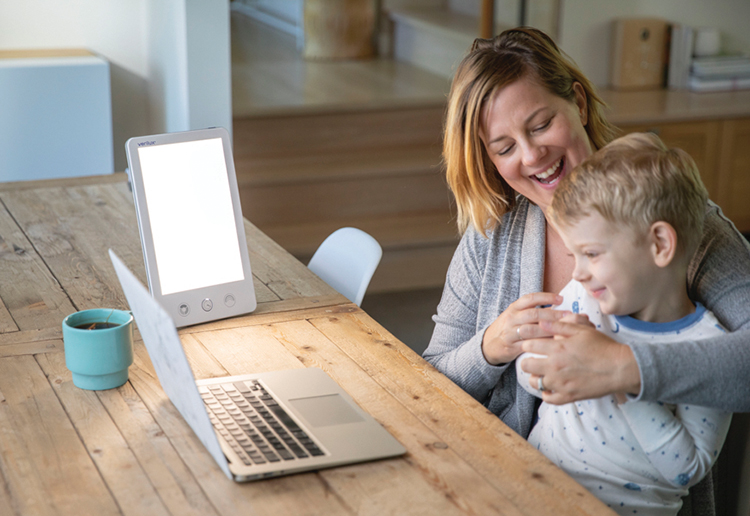Daylight savings time has hit and if 4:00 p.m. suddenly feels like the end of the world, you are not alone. Depression during winter is common, affecting an estimated 10 million Americans. If you have been diagnosed or believe you may have Seasonal Affective Disorder, or SAD, consult your doctor for a treatment plan that may include medication and therapy. Additionally, as the winter months approach, you can take steps to ward off symptoms. Here are some home products that can help.
MIMIC DAYLIGHT
Our bodies learn when to go to sleep and when to wake up based on natural light. This awareness is called our circadian rhythm. It can be thrown off during the winter when the days are shorter, impacting the amount and quality of sleep. Less sunshine may also reduce serotonin and melatonin levels, essential hormones for our rest and overall wellbeing. Using artificial lights to wake up in the morning or throughout the day could help improve depression symptoms or increase your energy level. For daily use light boxes, Dr. Adam Borland of the Mayo Clinic recommends looking for models with an output of 2,500 to 10,000 lux.
• Carex Day-Light Classic Plus
• The Sunbox Company Lux Bright Lights
• Alaska Northern Light’s North Star 10,000
• Verilux’s HappyLight Luxe LED Therapy Lamp
• Circadian Optics’ Lumine Light Therapy Lamp

The Hatch sleep system is a combination sunrise alarm, bedside light, and white noise/guided meditation speaker.
Another option is a light that slowly comes on in the morning to mimic the sunrise, usually in the form of an alarm clock. These lights may be helpful if you have difficulty waking up during the winter months.
• Phillips SmartSleep Sleep and Wake Up Light
• Hatch Restore Smart Sleep Assistant with Sunrise Alarm Clock
• JUXLamp Light Therapy Lamp Bio clock Adjustment Happy Light Alarm
ITEMS THAT BRING JOY AND COZINESS
In recent years, Americans have become more familiar with hygge culture —the Norwegian term for a mood of coziness. In your own home, cozy blankets, soft pajamas, candlelight, and hearty meals will give you something to look forward to as you move through the day. You could also go big with a single- person sauna, or get out and start a membership for the Washington Baths in Portland. Join a gym solely to use the steam room or tanning beds… and maybe work out.
HEALTH AND WELLNESS
Maintaining good physical health is a vital part of mental health care. Finding a winter sport you enjoy, from downhill skiing to backyard snowshoeing to pond hockey, will help motivate you to bundle up and sweat. Shoe spikes and walking/hiking poles are a very cheap way to get confidence and access to winter walking and hiking trails (or even just the sidewalk)

Shutterstock
Still, it can feel challenging when it’s cold outside and depression reduces motivation. Having exercise equipment in your home and using wellness apps can assist with keeping a positive daily routine. You can build an efficient in-home gym with just a few affordable exercise items, like free-weights, resistance bands, and a pull up bar. Fitness apps offer guidance, make recommendations, and often include an online community for additional support for exercise routines at all levels, from yoga to intense cardio.
Meditation is also helpful in combating depression by helping you stay in the moment and more easily recognize and deal with unwanted thoughts and emotions. Open Door Portland has weekly virtual meetings to help you get started. Meditation apps offer guided meditation and trackers to help build a daily practice.
Comments are not available on this story.
Send questions/comments to the editors.


